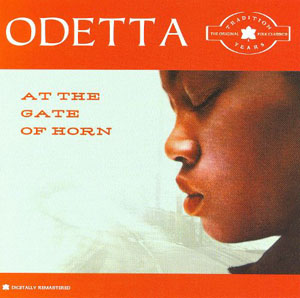 Albert Grossman, who among other things managed Bob Gibson and a number of other prominent folk artists, opened The Gate of Horn in Chicago in 1956. It became quite arguably the performance venue for the burgeoning folk music scene in the 1960s and early 70s — everyone played The Gate: Gibson and Camp, Glenn Yarborough, Joan Baez, Judy Collins, and Odetta.
Albert Grossman, who among other things managed Bob Gibson and a number of other prominent folk artists, opened The Gate of Horn in Chicago in 1956. It became quite arguably the performance venue for the burgeoning folk music scene in the 1960s and early 70s — everyone played The Gate: Gibson and Camp, Glenn Yarborough, Joan Baez, Judy Collins, and Odetta.
Odetta began studying classical music and voice at age thirteen. Taking a hard look at the possibilities of a career as an opera singer – this was in the 1940s — she joined the road company of Finian’s Rainbow and then turned to folk music. She learned to play the guitar and became one of the premiere singers in a field that was home to some incredible performers. (It’s worth noting that many of those same performers, including Bob Dylan and Joan Baez, cite Odetta as a strong influence; Harry Belafonte claims she taught him about dramatic interpretation in singing.)
Odetta has always displayed remarkable versatility — work songs, spirituals, jazz, blues, traditional songs from Appalachia, English folk songs, all entered her repertoire. And, in a genre in which “folk” rapidly became synonymous with “protest,” she is among the most subtle and affecting artists. A singer with incredible authority, she makes every song she sings her own. When Odetta gives you “He’s Got the Whole World In His Hands” or “Take This Hammer,” you believe.
As for this recording, a remastered and restored reissue of Odetta’s second LP: in a word, “goosebumps.” From the opening “He’s Got the Whole World in His Hands” through the bitterness of “The Gallows Pole” and the passion of “The Lass From The Low Countree,” here is Odetta. One forgets, as one’s memories do their editing, the remarkable range of expression she commands: yes, the deep thrum of that incredible voice is here in the songs mentioned above, along with an edgy — call it “anger” and hope you’re close — that breaks that voice in “Timber” and the playfulness of the story-song “The Fox.” She even makes “Greensleeves,” one of the most over-performed pieces of music ever, palatable. “Deep River” gets a blues treatment that is simply superb. “All The Pretty Little Horses,” which was always one of my favorites no matter who was singing, is simply devastating — a blend of tenderness and pathos that is hard to take. The final track, Odetta’s rendering of the Leadbelly song “Take This Hammer,” left me speechless.
Don’t ask for highlights — there is such variety of mood and treatment in this disc that it’s like a basket of mixed fruit, each one perfect. This one is the album for fans of folk music and of Odetta.
(Empire Musicworks, 2006 [orig. Tradition Records, 1957])
